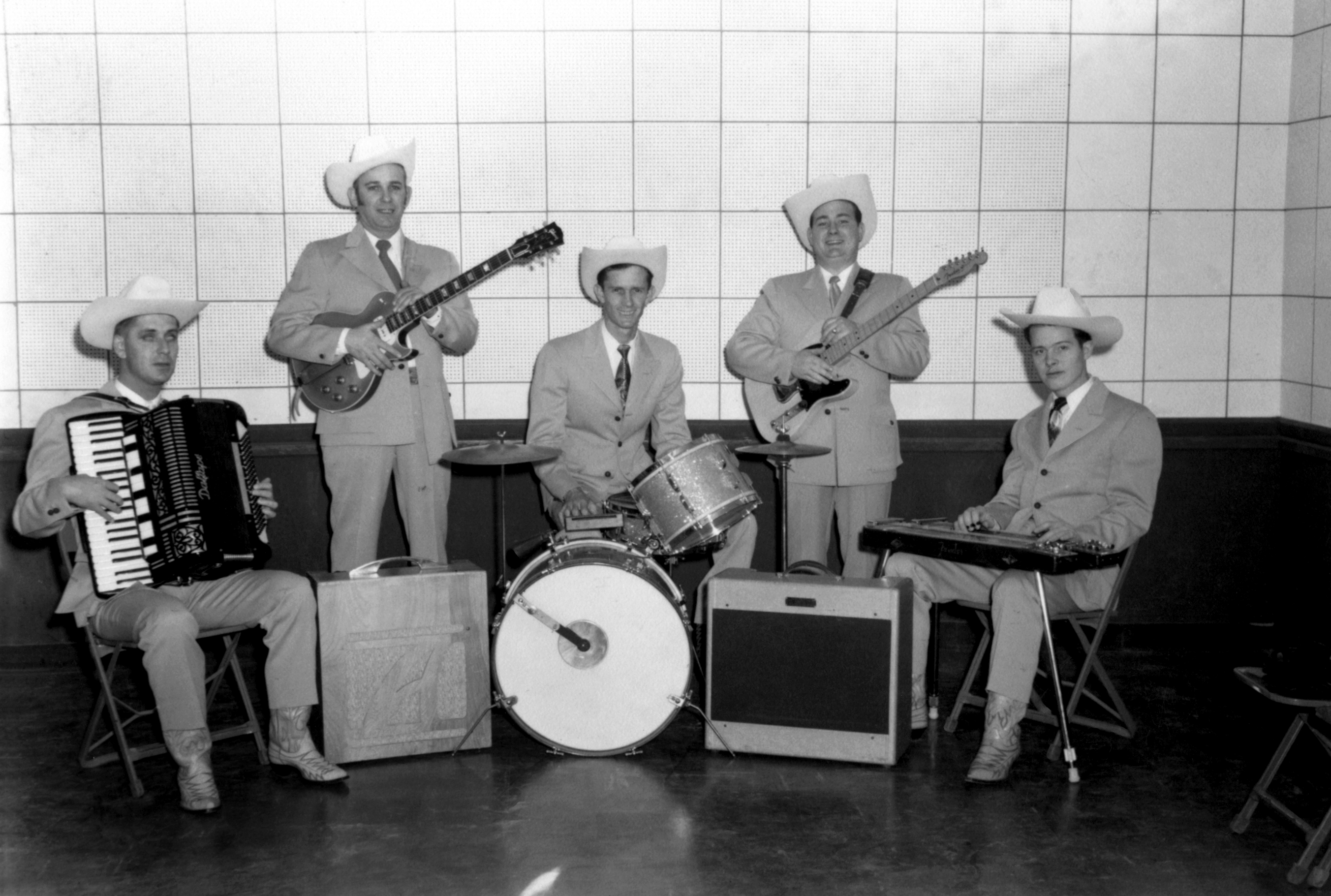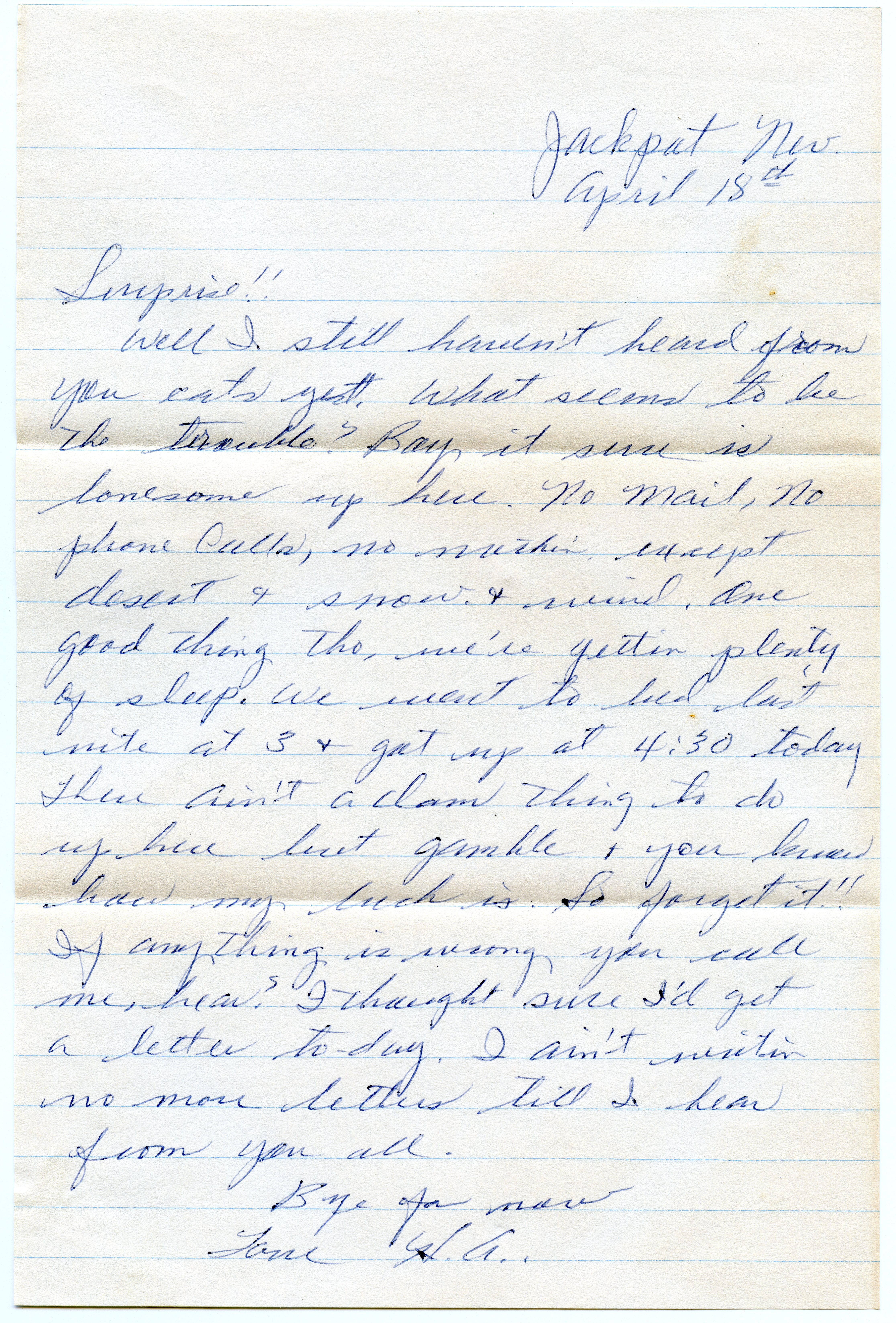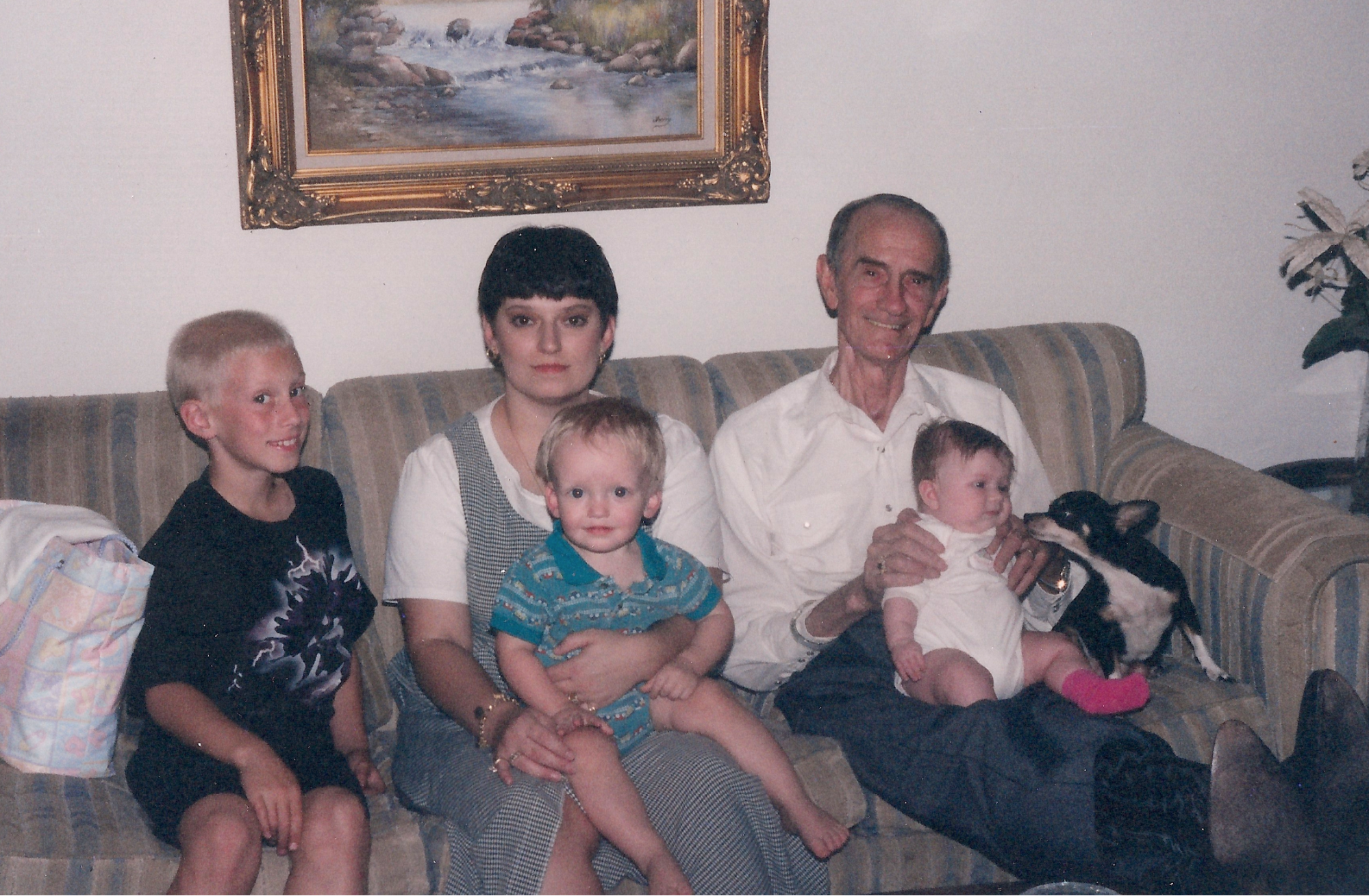From Shropshire to Sharpe
Profile of an Okie turned Californian
The door opens and a man walks in who is extremely tall with a very striking face underneath his big hat. He has on a dark grey, very tailored suit with a red shirt and a bolo tie, huge belt buckle and these big boots that make him even taller.
The man is Henry Shropshire, but most people know him as either Henry Sharpe, H.A. or H.S. — all depending on who you are, how you know him, and when you met him.
Humble-ish Beginnings
At a height of nearly 6 feet 4 inches tall, legendary Bakersfield drummer Henry Alvin Shropshire could have been an intimidating figure for anyone who found themselves at odds with him. Lucky for most people, an early and mostly innocent attempt at horse thievery left Shropshire with an idea of when not to cross certain lines.
One summer while growing up on the hot and sandy roads of 1930s Eufaula, Oklahoma, an eight-year-old Shropshire and a friend noticed an old man park his horse in town and walk away. In Shropshire’s words, he immediately decided they were “gonna be cowboys.”
“So we went over and got on his horse and we was just riding him around,” Shropshire said. “We wasn’t running him or nothing like that. We rode him all around town there.”
Nonetheless, the activity caught the attention of onlookers. After returning the horse and dodging a small posse composed entirely of the two’s respective older brothers, the young Shropshire made his way back home where he immediately encountered his mother.
“H-A, what have you been doing?” his mother inquired, using his standard acronymic reference.
“Oh, I ain’t been doing nothing Mama.” Shropshire said. “We just been riding a horse around awhile.”
“Well, I’ll tell you, they used to hang horse thieves,” his mother responded, before grabbing a lariat rope from his father’s tool shed, wrapping it around his neck, and hoisting him up a tree so that his toes just barely touched the ground.
More than sixty years later, Mama Shropshire’s lesson seemed to stick with the seventh of her eleven children.
“I haven't stolen anything since,” Shropshire said proudly with a laugh.
The Man Beneath The Ten-Gallon Hat
Though many may not recognize the name Henry Shropshire, the one-time failed horse thief turned musician crossed paths with many of Bakersfield’s most famed performers throughout his life under the stage name of “Henry Sharpe.”
However, the trail from Shropshire to Sharpe would take a number of twists and turns before the man beneath the ten-gallon hat could solidify his place in Bakersfield’s lexicon of music stars.
Shropshire’s musical career began in 1950 when he joined a band named “Chuck Harding and the Colorado Cowhands.” At the time, Shropshire had limited experience playing on what would become his signature instrument.
“I didn't know what a hi-hat was on the drums because we didn't have one,” Shropshire said. “I don't know why [Chuck] ever kept me. I didn't drink then and I was a good driver.”
Despite his inexperience, Shropshire learned fast and performed with Harding’s band at KBOA radio station in Kennett, Missouri. To make a living, the band made use of all hours possible performing at clubs during the night and working at radio shows during the day.
“Sometimes we'd have to drive 100 miles to go home,” Shropshire said. “Sometimes further. We tried to go where the money was, you know?"
Eventually, Shropshire decided to break away from Harding’s band and found himself working in different clubs throughout Oklahoma, Arkansas, Missouri and Illinois. Soon, Shropshire was playing the drums for a band called “Porky Sellers and his Arkansas Playboys” in Newport, Arkansas.
Dolores King, the wife of another musician that Shropshire worked with at the time, recalled Shropshire’s attention to detail and work ethic.
“One time, Henry got the legs of his white uniform a little dirty while we were on our way to a show,” King said. “We had to drive all the way back for him to switch clothes.”
King also reflected that Shropshire never drank while on the road, preferring “soda pop” instead. She told him his only sin was cigarettes.
On July 21, 1955, Porky’s band opened for a three-star lineup at the Silver Moon Club in Newport. However, the main star of the show had a problem: His drummer was too drunk to play. The group’s singer politely asked Henry to step in and join his guitarist, Scotty Moore, and bassist, Bill Black, for the night.
"Well, yeah, Elvis, I'll play behind you,” Shropshire said. “I know most of your stuff.”
There Is No Easy Way
While Shropshire’s brush with the King of Rock and Roll was memorable, the newest sound on the radio was not as exciting to him as the western swing bands he had been listening to from a young age like the Maddox Brothers and Rose.
Uninterested in the new trends of rock and roll and struggling for every last dollar, Shropshire decided to move back to his hometown to support his wife and daughter. Shropshire had married Jan Rosson in 1947 at the age of 20 and less than three years later became a father to daughter Cathy Lynn.
“I just got to thinking that there's got to be another way of making money,” Shropshire said. “So I just told the guys, ‘I'm flat gonna quit guys.’”
Without a clear future in sight, Shropshire jumped at the chance for a ride to a land of new possibilities. In 1957, a friend who was moving to California offered to give Shropshire a free ride across the country.
“I didn't have a dime,” Shropshire said. “I didn't have no money to offer to him.”
Desperate for money, he contemplated making the trek to California as the solo Shropshire on the trip. About 10 miles outside of town, his friend agreed to turn around and pickup the rest of the family.
“So we went back and got them and my first wife packed up what little stuff we had and clothes and things and we all three got in that car,” Shropshire said. “[My daughter] rode across that back thing by that back glass and we came to California.”
Shropshire set up camp in a one-room apartment in Oildale, a small community in Bakersfield. Soon, he had a job working at a car wash that allowed him to pay the bills, but with his eyes still fixed on a career in music.
In 1958, Shropshire decided to attend a show at the Pumpkin Center Barn Dance featuring Cousin Ebb Pilling's Squirrel Shooters. Shropshire dressed up in western clothes and a hat to enjoy the show.
The instructions he received told him to drive down Stine Road, but Shropshire couldn’t seem to locate the venue so he turned around and went back towards the center of town.
“I never did make it to that Cousin Ebb place out there,” Shropshire said. “I never did find it.”
Instead, Shropshire set his sights on The Blackboard Cafe where he entered the building still donning his prettied up clothes. Soon, he was talking with the band leader, Bill Woods.
“Howdy,” Woods said. “You a musician?”
“Well, I'm trying to be,” Shropshire responded.
After a short talk, Shropshire was sitting up on the band stand behind the drums with a microphone in front of him.
Evidently, Woods liked the short audition. Later, he called Shropshire at home and offered him a job in the house band.
Red Simpson, a fellow Bakersfield sound country music star, worked with Shropshire at the car wash and, years later, recalled the moment that he found out at the Shropshire had been hired at the Blackboard.
“He was at the car wash when I went to work at the car wash,” Simpson said. “Henry went to the Blackboard and I thought, ‘Man, that guy is so lucky. He don’t have to wash them damn cars no more.’”
Unforeseen Consequences
Working as a musician often meant spending time away from his family. When Shropshire wasn’t performing out of town, his hours at the Blackboard kept him busy throughout the night.
In 1963, Henry considered a move to Jackpot, Nevada where he was performing.
“Boy, it sure is lonesome up here. No mail. No phone calls. No nothing except desert, snow and wind,” Henry wrote in a letter to his wife and daughter dated April 18, 1963.
At the end of the letter he added: “I ain’t writing no more letters till I hear from you all. Bye for now. Love, H. A.”
Shropshire became a grandfather in December of 1968 at the young age of 41. He would later impart a piece of advice to his granddaughter: “Never date a musician.”
Shropshire spoke from personal experience as his first marriage fell apart in 1966. The time away from family presented opportunities that inevitably ended with a cost. Henry and Jan finalized their divorce in 1968 and, a year later, he married Margaret Ann Ray, a recent divorcee he met while working at the Blackboard.
Working at the Blackboard, Shropshire earned $16.50 a night and worked seven nights a week. Six nights a week, the hours went from 9 pm to 2 am, but the group worked a “double” on nights Sunday which meant starting at 1 pm and playing until 2 in the morning.
The hours were long and arduous, but, for a man who wanted to make a living in music, it was exactly what Shropshire was looking for.
“I loved every minute of it,” Shropshire said.
After his time at the Blackboard, Shropshire went on to work at various honky-tonks in the Bakersfield area including Tex’s Barrel House where he was immortalized with a caricature on the wall with other local music talents.
He would later form a band called “Henry Sharpe and the Sharpshooters” with fellow Bakersfield sound musicians Mel Lawrence, Gene Moles and Mack Owens. The group performed at various locations throughout the San Joaquin Valley including the Rodeway Inn in Bakersfield.
Later in life, Shropshire began performing at Hope Christian Center on the Glory Jamboree television program which was broadcast throughout Bakersfield. Shropshire was primarily driven to the church because of the opportunity to perform music.
Bill Woods Jr, the son of the man who gave Shropshire his first job as a musician in California, was one of the parishioners at the church during Shropshire’s performances. In 2019, Woods Jr., now the pastor of Hope Christian Center reflected on the church’s music of the 1990s.
“If I could return to any era of our music, it would be the country music group we had with Henry,” Woods Jr. said.
Shropshire, though popular among the people of Bakersfield, never became a national star and you won’t find him on Wikipedia. "We can’t all be stars," Shropshire remarked in a 1983 interview. “You have to have club people too.”
In 1997, Shropshire was diagnosed with terminal lung cancer and passed away the next year having met five of his great-grandchildren in the recent years. One of those great-grandchildren was me.
To the people of Bakersfield, “Henry Sharpe” was a legend, but to me, he was just “Grandpa.”




